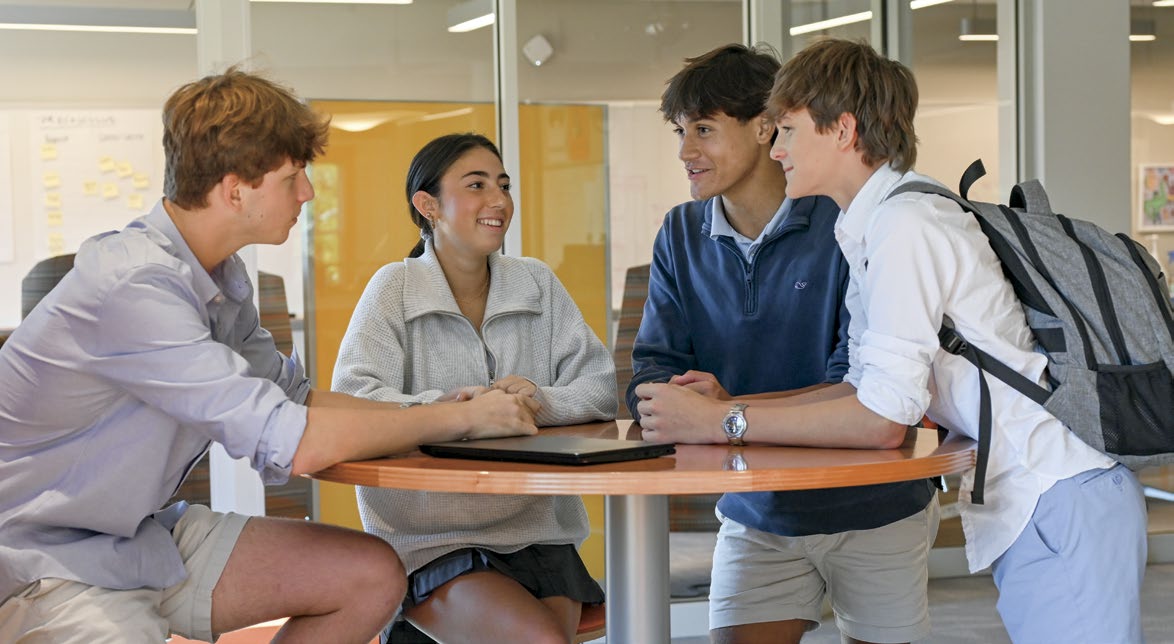
By Chris Winters, Head of Upper School
For the past few years, the Upper School has adjusted technology policies to help students find balance with their cell phones. After lackluster results, we came to the conclusion that our policies were having minimal impact on student phone use. This year, we took a more determined stance. Now, students in the Upper School leave their cell phones with their advisor for the duration of the academic day with access limited to urgent communication, occasional two-step verification, and various teacher-approved school projects.
No doubt, the addictive power of phones is hard to compete with, but during the school day, at least, we are seeing a positive change in student behavior.
Why did the Upper School institute this policy?
Research on the impact of excessive cell phone use among adolescents affirms the trends that we educators see in the day-to-day functioning of school. Left unchecked, students pay far more attention to what is on their phones than who they are with and what is around them. Student after student relates their shortened attention span, the frequent distractions, and the angst that their phone use has conditioned them for.
For an excellent resource on the effects of phones on adolescents, I direct you to an essay in The Atlantic by Jonathan Haidt, “Get Phones Out of Schools Now,” published June 6, 2023. Haidt argues that phones impede learning, stunt relationships, and lessen belonging. He describes research that correlates the distractions and loneliness besetting teenagers with their increased use of phones. In addition, the associated anxiety and depression have led Surgeon General Vivek Murthy to issue an advisory warning about social media: “We cannot conclude social media is sufficiently safe for children and adolescents.”
How have students and teachers reacted?
We announced the policy in the spring of the 2022–23 school year and reminded students and families of the new policy throughout the summer. It’s not an exaggeration to say that none of the students were in favor and even a few parents expressed their disagreement. When school started and the students deposited their phones in the phone caddies, I anticipated a mini riot. That didn’t happen. The Upper School students begrudgingly accepted our new policy. A couple of months in, I now have many students confiding that they “don’t mind” not having their phones and just as many telling me they “like the change.” During the academic day, the building is noisier with student talk and far more students than last year are using free time to meet with teachers and work on assignments. If I were to call this policy an experiment, we have compelling evidence to keep it going.
WHAT PEOPLE ARE SAYING . . .
Stephanie McDonald, Dean of Students
Since we’ve piloted this program to be cell phone-free during the school day, we’ve noticed a difference in students’ ability to get their work done, how they are performing on tests and quizzes, and most importantly, in their interactions with each other.
Almost every day, I hear from a student who really loves not having it. They can unplug from this 24/7 online narrative that is really important to their social existence. It allows them to take a break from it and they’re allowed to focus at school, be really present.
Kids are interacting with each other. They’re talking about whatever they’re working on and doing work together. They’re just engaged in meaningful conversation and making connections. It’s loud and exciting and it feels like what a high school should be. It’s all about what is happening in the building right now.
Paloma Snisky ’24
At the start of the year, I was hesitant to not have my phone during the school day, but as the year progressed, I felt so much more present and engaged with the people around me. I don’t believe that would have happened if I was constantly looking at my phone.
Avery Sleeper ’23
Not having a phone during the school day gives me the opportunity to utilize all the facilities GCDS has to offer during break times. Whether it is using the math or writing lab or just socializing with my peers, I appreciate the fact that I can be fully present. As it is my last year at GCDS, I am trying to soak up and enjoy every aspect of my day-to-day school life, and not having a phone makes this easier.


.jpg&command_2=resize&height_2=85)



.png&command_2=resize&height_2=85)


.jpg&command_2=resize&height_2=85)








.jpg&command_2=resize&height_2=85)



